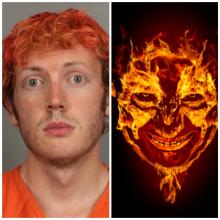devil
If it is “leftist propaganda” to talk about the poor, the widow, the orphan, and the immigrant, to talk about justice and love for God and neighbor, to talk about humility and grace — in short, to talk about the gospel of Jesus Christ, then let us do it all the louder. Otherwise, we trade the truth for power. We trade our witness for the respect of the empire.
As Jenna Barnett wrote yesterday in "The Devil We Know," the way Christians have thought about the devil has changed over time — and continues to change. The same is true of pop culture where a long fascination with depictions of the afterlife has led to some diverse and enduring depictions of Hell, demons, and even the devil himself. More recently, popular versions of demons and the devil have been particularly creative, from exploring Satan’s retirement to demented sock puppets. Here are just a few — six, to be precise — of the devils’s most loved (and hated) portrayals in books, movies, T.V., and beyond.
1. The Devil (Faust / Doctor Faustus)
One of literature’s most popular depictions of the devil, this version of the prince of darkness has gone on to inspire countless recreations in film, T.V., theater, and music. Beginning life as a German legend, then the subject of plays by Christopher Marlowe and Johann Wolfgang von Goethe, Doctor Faustus (or Faust) is the story of a scholar who sells his soul to the devil for the ability to practice magic. The devil as a shrewd dealer of desires can also be found in the music of Robert Johnson, stage productions like Damn Yankees, and T.V. shows like Supernatural, among countless other examples.
Appears in: Literature, Theater (Faust, Doctor Faustus)
THE DEVIL HAS long been wildly popular on stage, dating back to the Middle Ages when church authorities routinely cancelled performances because they worried that representations of the devil were so deliciously tempting that weak believers might falter. The dualistic image of a good, sweet angel on one shoulder and dirty demon on the other has infiltrated popular culture from children’s cartoons to adult sitcoms, signifying the struggle of our tempted conscience. And the devil always has the better jokes. In literary works, such as Paradise Lost and Doctor Faustus, the devil’s presence has driven plots forward through acts of temptation, leading the protagonist into some lusty or murderous act. The cliché is brought to life: “The devil made me do it.”
In 2015, the devil makes a serious comeback on Broadway in a successful run of Robert Askins’ new play, Hand to God, nominated for five Tony Awards, including best play and best direction. Askins takes his audience on a different kind of devilish journey.
While Christians waited to learn whether the Church of England would approve the consecration of women bishops, the church’s governing body — the General Synod — quietly voted to drop all future references to the devil in a new baptism service.
In the traditional service, godparents are asked whether they are ready to renounce the devil and all his works for the sake of the child being baptized.
“Jesus was led by the Spirit into the wilderness to be tempted by the devil.”
Thus begins the spiritual drama of Lent, the forty days before Easter that commemorates Jesus’ wilderness experience. No human, not even Jesus, can escape the temptation of the devil.
Just before Jesus was led into the wilderness, he was baptized in the Jordan River by John. As the Gospel of Matthew reports, when Jesus emerged from the water “a voice from heaven said, ‘This is my Son, my Beloved, with whom I am well pleased.’”
Jesus’ identity as God’s Son had always been true, but he received confirmation of his relationship with God at his baptism.
Tired of cursing the darkness, my husband Mark and I wanted to shine a light. To do this, we set up a production company called LightWorkers Media. The Bible miniseries, born out of this intention and released last year, grew so popular that we were able to make it into our Jesus film, Son of God.
The Bible series was in its third week when Jesus began to appear on the big screen. There was great excitement that Jesus was coming, with our trailers, various talk shows and even Twitter buzzing with anticipation.
He was beautiful and strong and kind and compassionate. His presence uplifted and encouraged people. It was everything we had hoped for.
The Church of England has been accused of “dumbing down” the baptism service following the introduction of an alternative liturgy in which parents and godparents need not repent of their “sins” or reject “the devil.”
In the traditional version of the service, parents and godparents are asked: “Do you reject the devil and all rebellion against God?” and “Do you repent of the sins that separate us from God and neighbor?”
In the alternative version, now being tested in 400 churches, parents are instead asked to “reject evil and all its many forms and all its empty promises.”
In the church of my childhood it was taught that the “age of accountability” was somewhere around 12. To hit the age of accountability was to, like, spiritually go off of your parents’ insurance. At age 12 the clock starts ticking, spiritually speaking; you know right from wrong now and because of this you are accountable for every time you screw up. And if you sin knowing right from wrong and then die before you chose to be baptized, you might burn in Hell for eternity. So age 12, as you can imagine, is when kids start choosing to get baptized. The lag time between entering the age of accountability and having your slate wiped clean through baptism can be terrifying. Many of us kids would pray not to die in a car crash before we were baptized, like other people pray to not get sick before their employee benefits kick in. So basically, 12-year-old Church of Christ kids experience a wave of devotion like a Great Awakening comprised only of sixth graders. And this is partly because we were all terrified of the devil and temptation and sin. Since, as we were told, all the bad things we’d done may have been washed clean in baptism, but the devil was waiting right outside the baptistery to try and get us to be bad again.
A Catholic priest has suggested that Satan may have driven accused killer James Holmes to open fire at a Colorado cinema, continuing the religious debate over a shooting that claimed 12 lives and wounded 58 more.
“Was he demon possessed? Maybe. It happens,” the Rev. Dwight Longenecker wrote on Patheos, where the Catholic priest from Greenville, S.C., is a columnist.
Religious leaders and public figures have sparked some of the most heated discussions in the wake of the tragedy as they have offered various explanations for the violent outburst and spiritual guidance for dealing with it.
My friend, Harry Jackson, said that my ideology isn't "Christian" but I suspect what he really means is that it isn't Republican and that's why he disagrees with the things I have said. It's important for Christians to understand those aren't the same thing. I think Bishop Jackson's economic ideology that is indistinguishable from Republican and Tea Party talking points, but I would rather have a civil discussion together as Christians about our differences; rather than his accusing Christians who don't share his conservative economic opinions as coming from "the councils of Hell." C'mon, Harry. I believe the Bible's teachings on wealth and poverty challenge both Republican and Democratic economic views which, sadly, are both often sold out to the interests of the wealthy and large corporations, when they should be focused on the ones Jesus calls "the least of these." Can we discuss that Harry?









